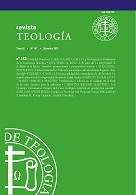Locke, on Theology and Property
DOI:
https://doi.org/10.46553/teo.60.141.2023.p207-220Keywords:
Locke; Acosta; Theology; Property; Amerindians; Conquest; Culture; Teleological Ethic; Deontological Ethic.Abstract
The aim of this article is to demonstrate that the type of ethics derived from the Lockean system of justice is teleological rather than deontological, as authors like Nozick and Simmons tend to suggest. I argue that the individual cannot be considered as an end in itself, but perhaps as a means to fulfill some other ulterior purpose, namely, to comply with divine will.
The main Locke´s conceptualization on antropologhy derived from Acosta´s works. The form in which Acosta studied Amerindians people and what he maintain about this people was more than important to Locke interest. Thus, is important to the study about Locke and his main thesis on theology and property studied, at least, the main thesis of Acosta on Amerindians.
Locke use Acosta argumentation about the characterization of barbarianism on Amerindians in the passage 102 of the Second Treatise. This is not fortuitous, but answer an important question: “what is the amerindian´s natural situation?”. To answer this, Locke ground his thesis on Acosta´s thoughts and research. Because of that, there is a necessary relation between Locke thoughts, thesis on Amerindians and the Acosta ones. The relation between anthropology and theology in Acosta works ground the lockean system not only about the theology but also the property one.
In this way, the lockean conquest project grounds, also, on the Acosta´s thesis about America and Amerindians. The person (a main concept in Locke) is the subject who can perform property, and it only could be possible is the subject is not a barbarian. The theology project that God writes in the hearts of the subject necessarily obligates the subject to perform property is he knows, by the culture in which he sustains his own life, the proper ways in which he could perform it. In the Amerindian ways of culture neither does not be possible that their people perform property at all, nor be sovereigns. The Christian ones who lived in Europe does.
Downloads
References
Batz, William. G. «The historical anthropology of John Locke». Journal of the History of Ideas 35(4). (1974) :663-670.
Caraccioli, Mauro J., «The learned man of good judgment: nature, narrative and wonder in José de Acosta's natural philosophy». History of Political Thought 38.1, (2017): 44-63.
Corcoran, Paul, «John Locke on native right, colonial possession, and the concept of vacuum domicilium». The European Legacy, 23(3) (2018): 225-250.
De Acosta, José. De procuranda indorum salute (<>, vols. XXIII y XXIV). Madrid: Consejo Superior de Investigaciones Cientificas, (vol. 1), Impreso, 1984.
De Acosta, José. De procuranda indorum salute (<>, vols. XXIII y XXIV). Madrid: Consejo Superior de Investigaciones Cientificas, (vol.2). Impreso, 1989.
De Acosta, José. Natural and Moral History of the Indies. London: Duke UniversityPress, 2002
De Las Casas, Bartolomé. Apologética historia de las Indias: de Fr. Bartolome de las Casas (Vol. 13). Bailly: Bailliere e hijos, 1909.
De Las Casas, Bartolome. Apología o Declaración y defensa universal de los derechos del hombre y de los pueblos. Salamanca: Junta de Castilla y León, Consejería de Educación y Cultura, 2000.
De Las Casas, Bartolomé. De las antiguas gentes del Perú (Vol. 21). Tip. de MG Hernández, 1892.
De Las Casas, Bartolome. Historia de las Indias. Edición, prólogo, notas y cronología de André Saint-Lu, 3, 1986-1988. Caracas: Biblioteca Ayacucho, 1951.
De Las Casas, Bartolomé. Brevísima relación de la destrucción de las Indias. Barcelona: Fontamara, 1974.
Del Valle, Ivvone. «From José de Acosta to the Enlightenment: Barbarians, Climate Change, and (Colonial) Technology as the End of History». The Eighteenth Century 54(4), (2003): 435-459
Fernández Peychaux, Diego, A. «La disolución de la 'personal majesty': el derecho de resistencia comunitario lockeano». Thémata Vol. 45 (2012): 119-139.
Fernandez Peychaux, Diego. A, «John Locke: los racionales, las bestias y la resistencia». Bajo palabra. Revista de filosofía 27 (2021): 193-212.
Fernández Peychaux, Diego. A, La resistencia: formas de libertad en John Locke. Buenos Aires: Prometeo, 2015
Ferrajoli, Luigi. «L'America, la conquista, il diritto. L'idea di sovranità nel mondo moderno». Meridiana 15 (1992): 17-52
Locke, John. Essay Concerning Human Understanding. Pennsylvania: Pennsylvania State University, 1999.
Locke, John. Goldie, M. ed. Political essays, Cambridge, Cambridge University Press, 1997.
Locke, John. Tr. Edmundo O´Gorman. Ensayo sobre el entendimiento humano 2ª ed. México: FCE, 1999.
Locke, John. Two Treatises of Government. Cambridge: Cambridge University Press, ed. Peter Laslett, 1960.
Locke, John. von Leyden, W. ed. Essays on the law of nature. Oxford, Clarendon Press, 1954.
Mills, Charles, W. «Locke on slavery». En The Lockean Mind. London: Routledge, 2021.
Mills, Charles, W. The Racial Contract. Ithaca: Cornell University Press,, 2014.
Pateman, Carole. Sexual contract. Stanford: Stanford University Press, 1988.
Peychaux, Diego, «John Locke: las posesiones o los derechos políticos como garantía de la libertad». Colección 20 (2017): 37-74.
Simplican, Stacy Clifford. The capacity contract: Intellectual disability and the question of citizenship. Minneapolis: Univesity of Minnesota Press, 2015.
Squadrito, Kathy. «Locke and the Dispossession of the American Indian». En Philosophers on race: Critical essays, Oxford, Ward, J. K., & Lott, T. L. (Eds.), (2002).
Tully, James. An approach to political philosophy: Locke in contexts Cambridge: University Press Cambridge, 1993
Udi, Juliana. «Locke and the fundamental right to preservation: On the convergence of charity and property rights». The Review of Politics 77(2) (2015): 191-215.
Udi, Juliana. « El derecho a la caridad: repercusiones de la teología cristiana en la teoría de la propiedad de John Locke». Revista de filosofía 70 (2014): 149-160.
Udi, Juliana. «Justicia versus caridad en la teoría de la propiedad de Locke». Revista latinoamericana de filosofía 38(1) (2012): 65-84.
Udi, Juliana. «Propiedad lockeana, pobreza extrema y caridad». Revista de estudios políticos 157 (2012): 165-188.
De La Jousselandière, Victor Santos Vigneron. «La doble marginalidad de José de Acosta: religión y soberanía en el virreinato del Perú (siglo XVI)». Summa Humanitatis, vol. 6, no 1, (2012): 1-36.
https://revistas.pucp.edu.pe/index.php/summa_humanitatis/article/view/3730.
Published
How to Cite
Issue
Section
License
Copyright (c) 2023 Emiliano Primiterra

This work is licensed under a Creative Commons Attribution-NonCommercial-ShareAlike 4.0 International License.


















 Teología
Teología